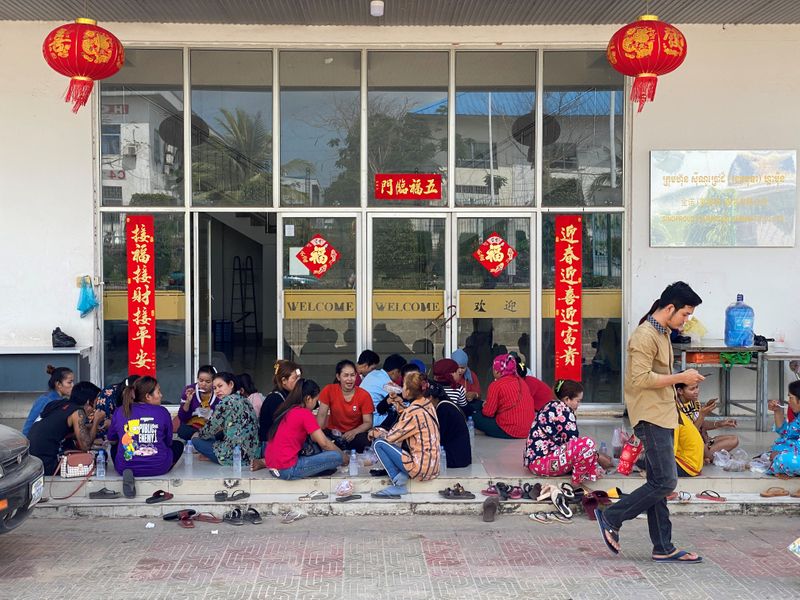By Keith Zhai and Matthew Tostevin
(Reuters) - When President Xi Jinping made his first state visit this year to Myanmar and signed new infrastructure contracts, there was no indication of the obstacle about to trip up China's plan for railways, ports and highways around the world: the coronavirus.
Travel restrictions to prevent the spread of the disease, which has now killed more than 1,800 people, have idled much of the world's second-largest economy and choked key elements of Xi's signature Belt and Road Initiative (BRI).
Chinese workers cannot get to overseas projects, and factories are cut off from the Chinese imports they need to keep running, according to more than a dozen company executives and officials.
"Many factories in China remain closed; those that are open cannot reach full capacity," said Boyang Xue, a China analyst at Ducker Frontier. "Since many BRI projects tend to source equipment and machinery from manufacturers based in China, the disruptions in industrial production and supply chain will cause further delays."
One giant project, China Railway International Group's $6 billion high-speed railway in Indonesia, is on a war footing.
The state enterprise has set up a task force to monitor the coronavirus' spread and urged all Chinese employees who went home for the Lunar New Year holiday not to return to Indonesia, a senior executive with the company said on condition of anonymity, as he was not authorized to speak to the media.
The company has stopped more than 100 Chinese personnel, mostly skilled workers or managers, from returning to the project linking Indonesia's capital Jakarta with the textile hub of Bandung, about 140 km (85 miles) away, the executive said.
"We have to focus on less-critical parts of the railway project until some of our key people come back to work," he said. "We're getting off to a very bad start in 2020. Our project has been dogged by delays and controversy, and this coronavirus brought us bigger challenges."
DISRUPTION
China's top regulator of state-run companies said in a Tuesday briefing that the outbreak has caused "difficulties" on some overseas projects and investments.
The country "has already communicated with overseas companies, overseas owners, and governments as early as possible to gain support and understanding," said Peng Qinghua, secretary general of the State-owned Assets Supervision and Administration Commission.
Several Chinese companies in Indonesia, including Tsingshan Holding Group, GEM Co Ltd (SZ:002340) and Zhejiang Huayou Cobalt (SS:603799) saw nickel and cobalt projects disrupted as Southeast Asia's biggest economy stopped flights from China in early February and denied entry to people who had been in mainland China in the previous 14 days.
"The new projects may be postponed a little, but not that much," said an executive at one of the companies, who had planned to travel to Indonesia before the travel ban made it impossible.
More than 133 countries have imposed entry restrictions on Chinese citizens or people who have visited China, according to the Chinese National Immigration Agency.
Pakistan's $62 billion China-Pakistan Economic Corridor (CPEC) said the coronavirus was not having an impact, although officials said some managers had been quarantined after returning from China.
The challenge of the SARS-CoV-2 coronavirus to Belt and Road contracts follows a pushback in 2018, when officials in Indonesia, Malaysia, Sri Lanka and elsewhere criticized projects there as costly and unnecessary.
China scaled back some plans after several countries sought to review, cancel or scale down commitments, citing concerns over costs, erosion of sovereignty, and corruption.
BROKEN SUPPLY CHAIN
The coronavirus has also started to disrupt the supply chains that give companies access to key machinery and components.
The offices of Chinese senior managers stand empty at the Cambodia Sihanoukville Special Economic Zone, which describes itself as a "landmark project" on the Belt and Road Initiative and is home to more than 160 businesses and over 20,000 workers.
Employees from Chinese-run factories told Reuters that most of the workers there were local, but that the greater challenge was their dependence on supplies from China.
That "could elongate project timelines, for example, which might raise costs," said Nick Marro, global trade lead at the Economic Intelligence Unit and a China analyst.
And although that might only affect operations in the first quarter - depending on whether the virus is contained - slower Chinese growth will have a regional and global impact, he said.
In some places on the Belt and Road, the impact of the coronavirus has already arrived.
Bangladesh has announced delays to several infrastructure projects, including commissioning of the Payra coal power plant, which was supposed to begin commercial operations in early February.
Well over 2,000 Chinese workers work on the plant and some 40 percent of them went home for the Lunar New Year holiday, local media reported. Twenty were allowed back to work on Monday after 14 days in quarantine.
(This story corrects spelling of name in paragraph 4)

(Reporting and writing by Keith Zhai; Additional reporting by Fanny Potkin, Tom Daly and Gibran Peshimam; Editing by Matthew Tostevin and Gerry Doyle)